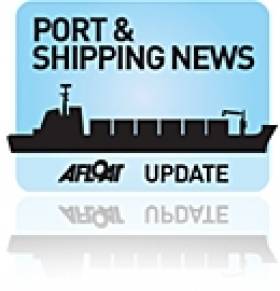Displaying items by tag: TrainForTrade
#Ports&Shipping - UNCTAD Deputy-Secretery at the TrainForTrade port management programme said ports in developing countries must be managed efficiently using modern methods to support international trade and boost local economies.
The Deputy-Secretary General Isabelle Durand was at a coordination meeting of the French-speaking network of the UNCTAD United Nations Conference on Trade and Development, which highlighted the challenges ports in the global South face match their importance in the global economy.
"As much as 80% of the volume of goods in the world are transported by ship," Ms. Durant said at the opening of the session, taking place in Geneva, 9–11 April.
"In addition to managing the goods they receive on time, ports – which are essential links in the global value chains – must prepare for the effects of climate change, rising temperatures, rising waters and of the emergence of extreme weather phenomena."
The meeting in Geneva of the francophone network is as part of Port Management Week that concludes today. More than 60 participants from 20 countries, are taking part in the event, which is supported by Irish Aid, Dublin Port Company, Port of Cork Company, and Belfast Harbour Commissioners.
TrainForTrade is supported by the ports of Nantes and Marseille in France, Dublin and Cork in Ireland, Belfast in the United Kingdom of Great Britain and Northern Ireland, and Gijon and Valencia in Spain.
Port training
Other hazards include economic and financial instability and threats linked to cybercrime, Ms. Durant added.
With 59% of global exports and 64% of global imports passing through a developing country port, maritime transport and port infrastructure remain at the heart of economic and social development in developing countries.
It takes a village
With a well-organized port sector, trade volumes increase as transport costs decrease, economic competitiveness is boosted, and jobs are created – but modern port management requires that this is done while respecting social equity, preserving resources and respecting the environment. And as regulations evolve, the complexity of managing ports increases.
"The TrainForTrade programme brings together ports from all over the world in a single ‘village’ where information becomes power and a tool for the development and modernization of our ports," Tanzania Port Authority Operations Manager Ebel Mwasenga said.
Building bridges
TrainForTrade helps bring efficiencies to developing country ports by encouraging trainees to look anew at their workplace and devise innovative solutions.
For instance, Togo port manager Koessanh Komlan Amatchoutchoui improved crew well-being and efficiency by building a footbridge in the port of Lomé which helps sailors to disembark while their boats are docking.
In another case, TrainForTrade graduates installed an electronic system for tracking outages on the Intranet network of the port of Dakar, Senegal – more than 21 kilometers of cables and optical fibers. This made it possible to reduce the time it took to identify frequent outages from one day to one hour, increasing port productivity.
In Benin, a new system for assigning dockworkers has proved highly profitable thanks to an optical reading of fingerprints at the entrance to the Port of Cotonou. This resulted in the better filtering of accredited employees, and a more judicious distribution of dockworkers at loading and unloading docks.
The TrainForTrade Port Management Programme also supports port communities in developing countries through networks of public, private, national and international institutions.
"In Haiti, there is no training in port management," Haiti’s TrainForTrade manager Oswald Rousseau said.
Training of trainers
The UNCTAD programme focuses on the development of human resources and fills this training gap.
Training is not only structured around exchanges of experience and best practice between countries of the global North and the global South, but also, thanks to the existence of a solid global network, between countries in Asia, Africa and the Americas.
UNCTAD also ensures that the impact of its programme is multiplied through the training of trainers, guaranteeing that its effect is felt not just in the same port, but also in port facilities of other developing countries.
In addition, with information and communication technologies, training can be provided at a distance, allowing a larger number of people to take part at low cost. UNCTAD issues an internationally recognized high-level "port certificate".
Trade, upgrade
UNCTAD has been offering the TrainForTrade training programme to developing countries wishing to upgrade their port infrastructure for greater efficiency and performance for more than 20 years.
Representatives of the member countries of the French-speaking port network – Benin, Cameroon, Ivory Coast, Gabon, Guinea, Haiti, Mauritania, Madagascar, Senegal and Togo – have gathered to review training activities in modern port management following a previous meeting held in Port-au-Prince, Haiti, in April 2017.
Dublin Port Company assist in “Train-For-Trade”
The training programme, also sought to foster economic development and was facilitated by the United Nations Conference on Trade and Development (UNCTAD) , Dublin Port Company experts and local experts from the Ghana Ports and Harbours Authority (GPHA).
Mr. Nestor Galley, the Director-General of GPHA, thanked UNCTAD, Irish Aid and Dublin Port Company for extending the training programme to Ghana and called on all companies at the port to get involved in the project. In addition to ensuring their staff is updated on best practices in port management.
Participants were awarded certificates and were drawn from customs, excise and preventive service (CEPS), MOL Ghana, Ghana Shippers Authority, Ghana Maritime University, Ghana Ports and Harbours Authority (GPHA) and Advanced Stevedoring Company. Other countires involved in the programme include Tanzania, Indonesia, Malaysia and Maldives.
























































